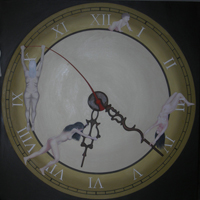Love & Your Biological Clock

Fact: each and every woman who can conceive has a biological clock. This internal physiological clock determines the beginning and end of fertility (except of course if you preserve eggs). Beyond a possible relationship between the mind and the functioning of this natural timer, how a woman relates to, thinks about, or feels about her biological clock and its current time matters. How? The most common complaint is, not enough time.
When a woman gets closer to the end of her fertility time, pressures to conceive may mount. This can affect what she feels and does in her love-life. A woman whose biological clock is closer to the end of its time will often feel pressures to meet her conception expectations independently of whatever love relationship she is in. What this means is, she will think of conceiving as equal too or in some instances more important than the particular lover she has and the status of her relationship with that person. In this state of mind, having a baby is more important than anything else. Of course, having a baby with a ‘sperm donor’ is always an option even though it presents its own list of challenges. I’ll save a discussion of this issue for another post.
Not having a baby because love-life considerations have delayed conceiving can feel like a big loss. The hard part is, in many instances a lover may not respond well to the pressures his partner is feeling to marry and/or conceive as soon as possible. This commonly happens when a woman has reached a more advanced age and met a man she would like to form a family with. He’s an excellent choice, only problem is he is not responding fast enough. Of course, the man has less or no incentive to hurry up and conceive within the confines of his partner’s biological clock. Especially if he does not share the same desire for children. If he does, that’s easy. If he doesn’t, then he’ll probably feel rushed and respond with resistance or even anger.
I think this is a problem that is best approached through an open dialogue about having children that will get at the issues and feelings involved. It won’t be the easiest conversation you’ve ever had, but the chances are better you won’t be resented or abandoned due to unwanted pressures and unspoken demands. Admitting directly your interest in having a child (or children) before your time runs out at the beginning of the relationship becomes an opportunity to find out if your partner and you are truly compatible on this level.
Unplanned pregnancies and deceptions will only lead to hard feelings and conflict that may end up negatively affecting the father of your baby, your baby, and yourself. From a man’s perspective, helping to make a baby for a woman he loves whose biological clock is ticking is an act of love. Knowing that your lover truly loves you is the first step in this process. Taking the risk to express your heart’s sincere desire for love in this form is the second step. Making it happen is the third. Dr. T. Jordan
